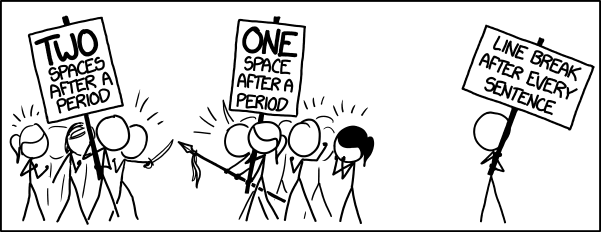I’ve reached a point in my life where I cringe whether I hear someone talk about a “Third Way.” Regardless of the context, this term is often used by privileged white men as a way to avoid responsibility, ignore power structures, and decenter marginalized people in order to protect the feelings of the privileged.
The white men who tell black protesters not to be so angry, because, you know, MLK!
The ones that believe an abused woman using self-defense against her abuser is just as “sinful” in God’s eyes as the abuse itself.
The ones that refuse to affirm that lesbian, gay, and bisexual relationships are good and holy, because they’re afraid of isolating conservative readers, tithers, and publishing companies.
Now, Third Way is a broad term that has been used in several different ways to describe several different stances. Maybe this isn’t the Third Way you’ve encountered. I can only speak from my experience.
If the bushy, white dude hipster beard fits, wear it.
Despite the way it’s been used, however, I think the concept of a Third Way can be a useful one. But, if your experiences with Third Way are similar to mine, this is going to require some defining and re-defining.
As an example, I’m going to talk here about how the concept of Third Way can be useful in the context of LGBTQ inclusion and affirmation in churches. I’m going to talk about how Third Way could be a positive path toward justice this context.
The Third Way of Walter Wink
Walter Wink is one theologian who has talked about a Third Way. I’m going to use his work as a starting point and build from there.
For Wink, the other two “ways” are the flight response and the fight response. [1]
I’m going to define the flight/fight responses a bit differently than Wink does, since we are discussing different concepts here. I’m also not going to moralize the flight/fight responses in the same way Wink does. For Wink, these first two “ways” are not the ways of Jesus. I don’t really agree with Wink on this point, but I’m not going to discuss that now because it’s not relevant here because of how I’m going to define these “ways” in this particular context.
In the context of LGBTQ people and the church, I offer these definitions of the flight/fight responses:
- FLIGHT: To leave non-affirming churches, avoid or break off relationships with people who are not affirming.
- FIGHT: To vocally and publicly condemn churches that do not affirm LGBTQ people/relationships/identities, even if it means risking losing one’s membership or job in a non-affirming church.
I submit that both of these ways are the ways of Jesus. Sometimes Jesus flipped over tables. Sometimes he went and spent time in the wilderness.
I also submit that these two ways aren’t always distanced from one another. It’s possible to leave a non-affirming church while still vocally condemning it, for example.
So if either of these ways are the ways of Jesus, why are we talking about Third Way?
Here’s why: Shit’s complicated, y’all.
The way I see it, there are at least two different groups that might need a Third Way here.
1. The first group is LGBTQ Christians—Some may be closeted, unable to safely “come out” at this point in their lives. Church communities are often important parts of people’s lives, and LGBTQ Christians are no exception.
These Christians could leave their church, but what if there are no affirming churches in their area? What if these Christians are living with non-affirming parents who would kick them out for being LGBTQ or for leaving the church? What about LGBTQ Christians trapped in abusive fundamentalist churches, or who are still trying to reconcile their LGBTQ identities with their faith?
These Christians need something beyond fight/flight.
2. The second group is straight/cisgender clergy who are affirming, but ordained in non-affirming churches—Let me start by saying that I do not believe “ally” pastors should sit on the fence about this issue in order to protect themselves.
But sometimes an “ally” pastor can best serve their LGBTQ congregation members by staying—which means “flight” is not an option, and “fight” is a risky one.
Every church situation is different.
Ally pastors, listen to your LGBTQ members. Ask them what they need from you. Do they need you to take a strong stance, even if it means risking discipline from the “higher ups?” Do they need you do leave, start your own fully affirming congregation? Maybe.
But then again, maybe not.
There will always be LGBTQ people in non-affirming denominations, and those people might need pastors who affirm them and help them as they work for change. This is where Third Ways can be useful.
Actually, Third Way is a bit of a misnomer.
There are so many ways. Every church is different. Every LGBTQ person is different and has different needs. Every clergy member has a different calling.
But let’s go back to Wink’s idea of Third Way for a second, because we need to talk about what Third Way should not look like.
One example of Third Way that Wink uses is Jesus’ suggestion to “turn the other cheek.” Wink points out that, in Jesus’ culture, turning the other cheek was not about turning away from injustice and ignoring it. It was also not about being a doormat; it was not about letting people oppress and harm you.
The people Jesus’ spoke to in this gospel narrative would have understood [2] that turning the other cheek was a way of telling those who would harm you, “This is wrong, and you should be ashamed.”
Ally pastors who try to use Third Way to please everyone—oppressed and oppressor alike—are not practicing Jesus’ Third Way.
The people Jesus’ spoke to were likely slaves, or Jewish people under Roman occupation. They likely could not physical defeat their oppressors through violent revolt without getting killed. They also could not simply flee their oppression.But they could still affirm their humanity and the humanity of others, even when flight/fight responses were not possible.
And so can we.
Third Way is about refusing to be trapped in limiting binaries. It’s about finding creative ways to work toward justice. It’s not about keeping the peace. It’s not about making everyone happy. It’s not about sitting on the fence.
God works in mysterious ways (Third Ways?), but God is not concerned with cheap “peace.” God wants shalom. God wants justice. And God always, always sides with the oppressed.
We need lots of ways. We need Third Ways and Forth Ways and Five Hundred Ways. Oppression is subtle and adaptable and multi-faceted. We need all the “ways” we can get. But a Third Way that tries to “see both sides,” while refusing to actually challenge oppressors is not God’s Third Way.
________
[1] Website Describing Wink’s Third Way
[2] For more information on what “turn the other cheek” could have meant to the people in Jesus’ day, this website.















